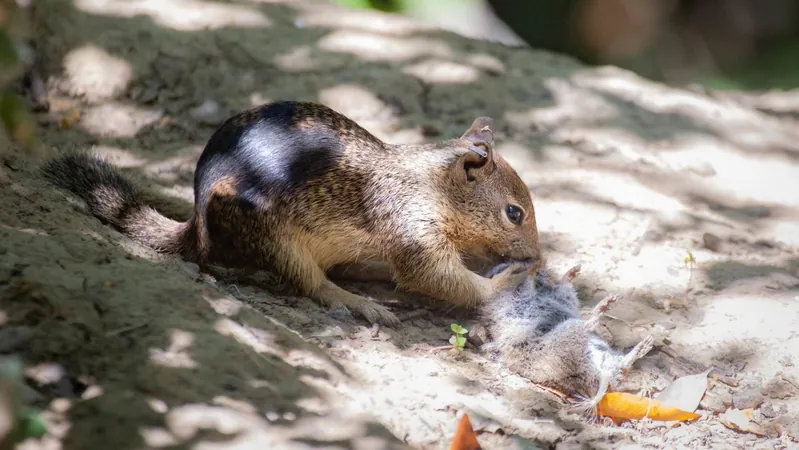
California Squirrels Go Carnivorous: Unprecedented Behavior Unveiled!
2024-12-18
Author: William
California Squirrels Go Carnivorous: Unprecedented Behavior Unveiled!
In a groundbreaking study, scientists have uncovered astonishing evidence that California ground squirrels, typically known for their nut-gathering antics, are exhibiting carnivorous behaviors by hunting and consuming voles. This shocking revelation, published in the Journal of Ethology, marks a first in documenting such predatory practices among these squirrels, previously classified as herbivores.
Conducted at Briones Regional Park in Contra Costa County, this research is part of the Long-Term Behavioral Ecology of California Ground Squirrels Project, which focuses on how these native rodents adapt to environmental changes. Researchers noted an alarming rise in local vole populations, which prompted the squirrels to alter their long-standing diet.
In parts of Northern California, major vole infestations have been reported, with researchers noticing a significant increase in their numbers over the past decade. The squirrels who once primarily feasted on plants and seeds are now found hunting live prey, showcasing their adaptability in responding to changing ecological dynamics.
Jennifer Smith, associate professor of biology at the University of Wisconsin-Eau Claire and lead author of the study, expressed her astonishment: “This research radically changes our perception of squirrels, one of the most familiar mammals in the world. They are resilient creatures, proving they can adapt to thrive amidst human-induced challenges like climate change.”
A Closer Look at their New Diet
During the span of the study from June 10 to July 30, researchers employed live traps to monitor the squirrels’ behavior closely. They recorded a staggering 74 interactions between squirrels and voles, with 42% of those encounters resulting in the squirrels actively hunting and consuming their prey.
This unprecedented dietary shift emphasizes squirrels' potential classification as opportunistic omnivores. John Koprowski, dean at the Haub School of Environment and Natural Resources and an expert in the field, pointed out: “Hunting voles not only provides squirrels with essential protein, but it also presents an efficient nutritional advantage in times of prey abundance.”
The findings suggest that this flexibility in feeding strategy, termed “dietary plasticity,” allows squirrels to survive and flourish, especially in environments with fluctuating food sources.
The Ecological Ripple Effect
While some may find the prospect of squirrels preying on voles unsettling, Koprowski reassures us that this ecological balance is quite normal. Voles, often considered pests due to their rapid population growth, benefit from natural predation, which helps to stabilize their numbers and support woodland ecosystems.
Moreover, this study opens up avenues for future research into how different species adapt behaviorally to environmental changes. As Jennifer Smith puts it: “In a world increasingly impacted by human actions, these findings highlight the remarkable resilience of some species. By examining these adaptations, we can glean essential insights for ongoing conservation efforts.”
California's squirrels are proving that evolution in dietary habits is not only possible but may be essential for survival in an ever-changing world. Keep an eye out—what other surprises might these adaptable creatures have in store for us?









 Brasil (PT)
Brasil (PT)
 Canada (EN)
Canada (EN)
 Chile (ES)
Chile (ES)
 España (ES)
España (ES)
 France (FR)
France (FR)
 Hong Kong (EN)
Hong Kong (EN)
 Italia (IT)
Italia (IT)
 日本 (JA)
日本 (JA)
 Magyarország (HU)
Magyarország (HU)
 Norge (NO)
Norge (NO)
 Polska (PL)
Polska (PL)
 Schweiz (DE)
Schweiz (DE)
 Singapore (EN)
Singapore (EN)
 Sverige (SV)
Sverige (SV)
 Suomi (FI)
Suomi (FI)
 Türkiye (TR)
Türkiye (TR)